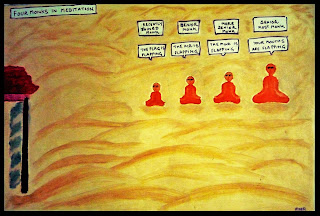'Mushin' - No mind or Empty mind - is a state where the mind is not preoccupied by any thought or emotion. It is empty in the sense that it is unbiased , free and adaptable. It is to act according with Nature, nothing else.
Dhyana - Chan - zen - meditation is being aware of and pursuing thereby the vehicle for Enlightenment. Transformation from the External World to the Internal then again to the Boundless Eternity envisages gradation just like any academic in the making. It's the process of harnessing of wild horse like mind to become 'no mind', defined at the outset.
'Samyuktagama Sutra' mentions about four types of horses - 1. Excellent 2. Good 3. Poor 4. Bad. The Excellent horse runs slow or fast, right or left at the will of the rider before it sees the shadow of the whip. The Good horse runs as well as the Excellent but just before the whip reaches it's skin.
The Poor horse runs when it feels pain on it's body. The Bad horse runs after the pain penetrates deep within up to the bones of the body. So, cajoling of one's mind might be a necessity in the initial phase of a beginner in meditation. The transition in meditation culminates in the mind attaining fluid state, like water, instantly taking shape of the container - adapting to the situation, without any delusion or discrimination.
The zen stories look to be fairly simple but the inner meaning that the dialogues carry has depth. Previously we had such a story in “The Pilgrim’s Progress” in which I humbly accepted that the inner meaning was a chance revelation only after a span of more than three years of my original browsing of the story.
Today also we have one such anecdote to enthuse about
the concealed content….'Once in the front yard of a zen monastery four resident
monks sat for meditation. They were of
varied seniority. After a while, the
junior most monk among them who had joined the monastery quite recently, observed the
fluttering flag on the monastery building. He exclaimed, “The flag is
flapping!” The second monk sitting
beside him- and a little bit senior to the first one remarked, “The wind is
flapping!” The third one who was having
more seniority than the second one explained, “The mind is flapping!” Interrupted by what was going on among the
other three monks, the forth one who was the senior most among them said, “Your
mouths are flapping!” '
This story depicts four different stages of
meditation. The first monk joining
recently in the monastic fold, had still admiration of the physical (gross
level) things and happenings going around in the material world represented by the
fluttering flag, with his eyes kept wide
open. The second monk crossed the gross
physical plane but still obsessed with subtle ones like ‘feeling with mind’ the
invisible wind. The third one a little more advanced in meditation but still
swaying with ‘thoughtful (about flapping) mind’. And now the senior most monk’s words, “Your
mouths are flapping!” reflect, in the ripened state of meditation, the essence of zen – only Action, movement of
lips, at the present moment with no thought process of the mind whatsoever,
analytically attaching to the Action, involved. "In the beginner's mind there are many possibilities, but in the expert's there are few"---Shunryu Suzuki in his book 'Zen Mind, Beginner's Mind'.
In fact, the way I actually live at present is well in consonance with the Sadguru's saying, 'In reality, there is only Now. If you know how to handle This Moment, you know how to handle the whole Eternity.'
Om Shanti!

No comments:
Post a Comment